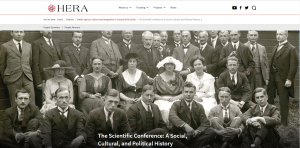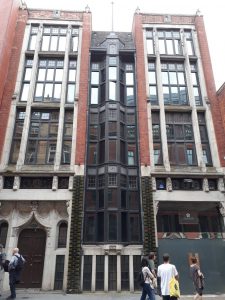August 1, 2019, by Stephen Legg
Between Science and the City: Connecting Conferencing the International

The Scientific Conference HERA project, web homepage. Image credit: Meeting of Utrecht chemists, 1921, Collection Universiteitsmuseum Utrecht, inv.nr. 0285-25631-13
The beginning of the summer has offered two opportunities to establish dialogues between our project and two new and exciting initiatives. On June 21st Steve travelled to Birkbeck College, London, to meet the four Principal Investigators on the new HERA funded project entitled “The Scientific Conference: A Social, Cultural, and Political History”. Steve had been invited by Jessica Reinisch, whose work on the Reluctant Internationalists project had been an early inspiration for our own grant proposal. Collaborations between our two projects have included an online interview, workshop collaborations and conference presentations.
Steve was asked to reflect on the HERA project proposal and our AHRC project experiences over the last three years, as the HERA team prepares for archival research into European scientific conferences from the 1880s-1980s. Steve’s comments on the fascinating research agenda focused on:
- History: the century timespan traverses the emergence of modern conferencing in the interwar period, through into the period of both decolonial and cold war conferencing; how did this broader shifts in conferencing form effect not only the form but the content of scientific conferencing?
- Method: perhaps the core conundrum of studying broader processes (whether imperialism, radicalism, internationalism or science) via their conference spaces it the question of causality. Is it possible to prove that a conference (or one of its component parts) caused a shift in thought, a particular outcome, or a breakthrough in scientific knowledge? And should we be attempting to forge these linear causal relations even if they were thought possible? Another vital question is that of the archive. Conference organisers self-consciously archived their meetings, through public documentation at the time (press releases, posters, pamphlets, interviews) and afterwards (institutional repositories, interpretative publications). How do we gain critical distance from the conference archive?
- Geography: how do we expand the relevant spaces of the conference beyond the venue itself? What different lessons do we learn in the hotels, restaurants, forms of transport etc which facilitated and made the conference work? How does such expanded scope place the conference into a set of different relations (of attentive observers in other countries, of links to foregoing and future conferences, of negotiations between regionalisms, nationalisms and internationalisms)?
In terms of lessons or advice from one conferencing project to another, Steve initiated discussion on the following topics:
- The “meta” question: working on conferences that shaped historical public understanding, as academics who often do their work through conferences via funding bodies who require public engagement, provides endless opportunities for “meta” feedback loops! (Our December 2018 conference had the [private] working title of “Conferencing the International: an International Conference on International Conferencing”). The practice of organising workshops and conferences do also provide very practical insights into the practices under study, despite the very obvious differences in terms of infrastructure and purpose. Similarly, the use of blogs and webpages explicitly seeks to construct a learned public in the ways historical conferences and their organisers desired. Reflecting on these processes (in online and other media) was encouraged.
- The “science” question: beyond questions over whether the human, behavioural and psychological sciences would be involved, Steve encouraged the consideration of the science of The period in question saw the uptake of acoustics, broadcasting, lighting, air-conditioning and projection as sciences which sought to facilitate and manipulate attendee and delegate experience. Returning to the “meta” question, the endpoints of this process are the annual conferences on the science of conferencing which take place in the UK each year (as discussed at our workshop on university conferences).
Between July 11-12th Steve attended the “Pursuit of Global Urban History: A Dialogue Between Two Fields” conference, which had been co-organised by the Global Urban History Project and the University of Leicester’s Centre for Urban History. The conference made the case for global history’s engagement with cities as a vital space through which globalisation (very broadly understood) happened and through which global history has to be read. Professor Sunil Amrith gave a fantastic keynote, proposing we think of port cities not just as one of the archetypal city-forms of global urban history, but also nodes that need to be considered through environmental as much as urban history.
Steve’s paper (“International Conferences, the Global, and the Urban: Making India in 1930s London”) drew upon project work on international conferences as both city-making and as city-dependent to also make the case for a cultural and historical geographical approach. Drawing upon our work on international London research he showed how the Round Table Conference drew upon public (though highly regulated and policed) spaces (such as the Cenotaph, the Palace of Westminster and St James’ Palace) as well as private spaces (such as ‘At Home’ social events or delegate accommodation). The very different political homes of Nancy Astor MP and Muriel Lester were used to explore the links between the public and the private during a conference with global ramifications in terms of imperial and anti-colonial politics.
No comments yet, fill out a comment to be the first


Leave a Reply